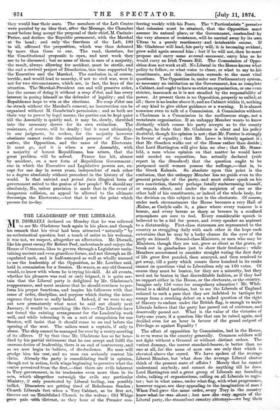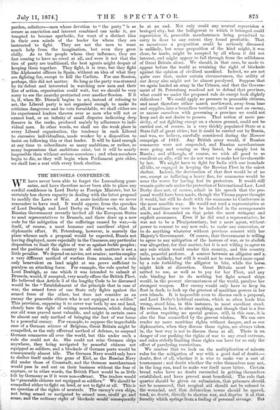THE LEADERSHIP OF THE LIBERALS.
R. DISRAELI declared on 'Monday that he was relieved
to see Mr. Gladstone back spin in his place, and though his remark that his -rival had been attracted " naturally " by an ecclesiastical question -lent a touch of satire to his welcome, it was not, we suspect, altogether -an affectation. Mr. Disraeli, like his great enemy Sir Robert Peel, understands and enjoys the House of Cosrmons,likes to govern through a Legislature main- taining ancient and even grandiose forms, and not through an ill- regulated-mob, and is half-annoyed• as well as wholly amused to- see the leadership of the Oppesition, as Mr. Lowther said, held in commission for a• Session. -He wants, as any old General would, to know with whom- he is trying his ski'. At all events, whether his pleasure waa real or only feigned, it is quite cer- tain that the Liberal party is - delighted by Mr. Gladstone's reappearance, and- most anxious' that he should continue to per- form his proper functions, and inspire his followers with that sense of order, 'discipline and purpose which during the inter- regnum they have so sadly lacked. Indeed, if we were to say out now prematurely what must be said out clearly next January, it would be- something like this :—The Liberals have not found the existing arrangement for the Leaders* work 'well,- and while tolerating it on a -sort of compulsion for one Session, will insist that it should come to an end before the opening of the next. The sailors want a captain, if only to abuse. The ship cannot be managed for ever by a vestry-meeting of its officers. If by that time'Mr. Gladstone has so far bene- fited by his partial retirement that he can accept and fulfil the onerous duties of leadership, there is an end of controversy, and as we now begin -40 believe, of disobedience. No man will grudge him his rest,-and no man can seriously contest his claim. Already-the party is consolidating itself in opinion, though not in action, both wings beginning to perceive what the centre perceived from'•the firet,—that there are evils inherent in -Tory government, in its tendencies even more than in its acts, which -altogether outweigh the evils any particular Ministry, if only penetrated by Liberal feeling, can possibly inflict. Dissenters are getting tired of Rehoboam Bandon ; Church Liberals fret -when a 'Tory Cabinet, as its first act, throws out sn'Eatablisheel- Church -to the -wolves ; Old Whigs grow pale -akith4distrast, as they hear of the Premier con- ferring weekly with his Peers. The " Particularists " perceive that cohesion - must be attained, that the Opposition must assume its natural place, or the Government, unsteadied • by the very absence of resistance, will be carried away by its own Ultras to a purely reactionary :and intolerable course. If Mr. Gladstone will lead,his party will. it is becoming evident, grow solid again around him ; but if he will not, then he must propose and carry some avowed 'successor, carry him as he would carry an Irish Tenure Bill. -The Commission of Oppo- sition does not work atall. No Liberalin the House knows what policy' to follow, or what •-voice to cheer, or what to. say to his constituents, and this hesitation ,:extends to the -most vital questions. The Opposition is, under our Parliamentary system, as -necessary an-institution as the Government, has as complete a Cabinet, and -ought tolave as strictan organisation, or one even stricter, inasmuch as it is not steadied by the responsibility of power. At present there is no Opposition, properly so called, at all ; there is no leader above it, and no Cabinet withinit, nothing of any kind to give either:guidance or .a warning. It is almost nonsense even to talk of a Commission. A Commission without a Chairman is a Commission in the molluscous stage, not a vertebrate organisation. if an :unhappy Member wants to know distinctly which course his party accepts as to the county suffrage he finds that Mr. Gladstone is silent and his policy doubtful, though his opinion is not ;;that Mr.-Forster is strongly in favour of equality ; that Mr. Lowe is bitterly against it ; that Mr. Goschen walks •out of 'the :House rather than decide ; that Lord Harrington will give him no clue ; that Mr. Stans- fold, a man whose opinion on that matter he would have said needed no 'exposition, has actually declared (vide report in the Standard) that the question ought to be postponed until women possess the suffrage,—that is, to the Greek Kalends. So absolute upon this point is the confusion that the--unhappy Member has no guide even -to the general principle of the "party, -and must either speak on his own conviction, thereby perhaps fatally embarrassing himself, or remain silent, and under the suspicion of one or the other half of his constituents,-or indeed of the whole body, for the division• on this subject is not in the electorate. Of course, 'trader such circumstances the -House becomes a very Hall of Raolus, as Carlyle calls it, a place where every rumour is a breeze, and every breeze as sharp as breezes in a confined atmosphere are sure to feel. Every considerable speech is believed to be a bid -for -power, and every speaker an aspirant to a dictatorship. First-class statesmen-are represented to• the country as struggling daily with each other in the hope each entertains that he may by a lucky-chance fix the eyes of the party on himself. Second-class Ministers, or men who maybe Ministers, though they are not, grow as silent as the grave, or
'
break out in gambadoes - just to show their freshness ; -while Members accustomed to consider straight voting the fast duty of life grow first puzzled, then annoyed, and then resolved- to get away, till a party which counts three hundred in its ranks cannot on questions vital to Liberalism rely on 160 votes. Of course they must be beaten, for they are a minority, but they need not- be beaten in that discreditable fashion,..as if they had no support _either in the House, or the electorate, or the country. Imagine only 156 votes for compulsory education t -Mr.•Whit- bread is a skilful tactician, but to see the-Liberals of England reduced to such a pass that they are indebted to tactique for escape from a crushing defeat on a naked question of the right of Slavery to endure under the British flag, is enough to make Liberals believe that the party has passed out of existence, and deservedly passed out. What is the value of ' the victories of forty-one years, if .a question like that can be raised again, -and decided even for an hour in favour of the grand outpost of Privilege as against Equality ?
The effect of opposition by Commission, bad in the House, is even worse in the country generally. Common soldiers will not fight without a General or without -distinct orders. The veriest dummy, the merest standard-bearer, -is better than no one at all, for the mass of men can see only that which is elevated above the crowd. We have spoken of the average Liberal Member, but 'what- does the average liberal elector think of the present state of affairs ? Merely that he cannot understand -anybody, and cannot do anything till he does. Lord Harlington and a great group of Liberals are founding clubs, talking of organisations, calling on all Liberals to regis- ter ; but in what name, under what flag, with what programme, however vague, are they,appealing to the imagination of men ? When Peel gave the.-same 'order, every Tory in the country knew what he,was about ; but now the -very agents of the Liberal party, the-4taunaliest country -attorneys—we beg their
pardon, solicitors—men whose devotion to " the party " is as secure as conviction and interest combined can make • it, are tempted to become apathetic, for want of a distinct idea in their own minds of the leader for whom they are instructed to fight. They are not the men to want much help from the imagination, but even they grow chilly. As to the people whom they influence, they are fast coming to have no creed at all, and were it not that the ties of party are traditional, the best agents might despair of keeping them together. They fight, it is true, but they fight like Alphonsist officers in Spain, without an idea of what they are fighting for, except to kill the Carlists. For one Session, perhaps, this did not matter. So long as the party was stunned by its' defeat and interested in watching new men and their line of action, organisation could wait, but we should be very sorry to see the anarchy protracted over another Session. If it is„ if, when Mr.. Disraeli' begins to act, instead of refusing to act, the Liberal, party is not organised enough to make its criticism dangerous and its vote formidable, we shall either see its experienced leaders thrown over as men who will not or cannot lead, or an infinity of small disputes indicating deep fissures in the ranks, produced mainly by adherence to.indi, vidual men. In other words, we shall see the weak place in every Liberal organisation, the tendency in each Liberal to excessive individualism, made weaker by a disposition to insist on following this or that leader. It will be hard enough at any time to subordinate so many ambitions, or rather, so many impressions that ambitions exist, but it will be nearly impossible then without serious secessions ; and when members begin to die, as they will begin when Parliament gets older, we shall lose a seat with every fresh election.



































 Previous page
Previous page